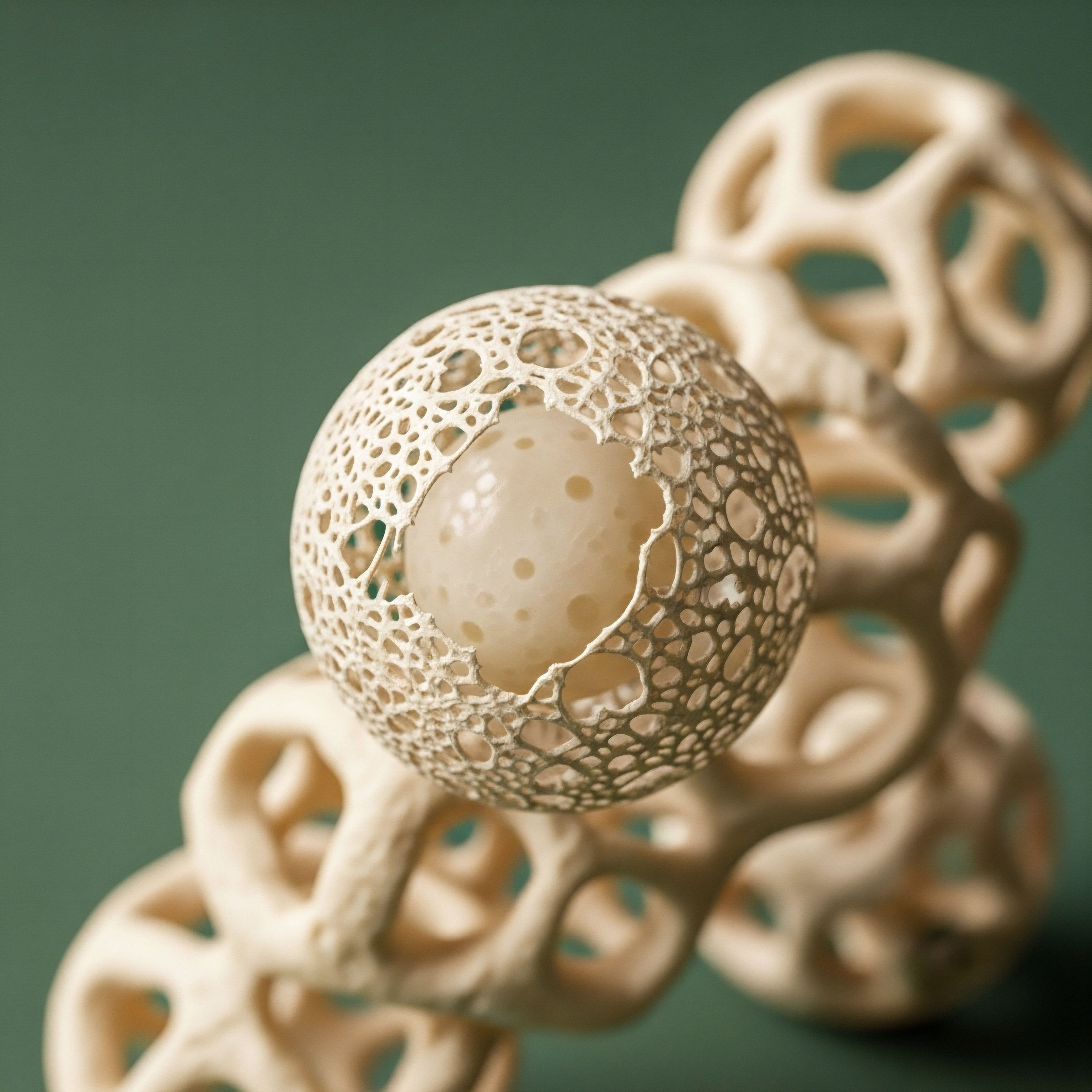

Fundamentals
Have you ever experienced a persistent weariness that no amount of rest seems to alleviate? Perhaps a mental fogginess that clouds your thoughts, or unexplained shifts in your body’s composition? These subtle yet pervasive sensations can feel deeply unsettling, often leaving individuals searching for explanations that extend beyond simple fatigue or the stresses of daily existence.
Your body communicates through an intricate network of chemical messengers, and when these signals become disrupted, the effects ripple through every aspect of your well-being. Understanding these internal communications is the first step toward reclaiming your vitality.
At the heart of many such experiences lies the thyroid gland, a small, butterfly-shaped organ situated at the base of your neck. This gland acts as a master regulator of your metabolism, influencing how every cell in your body utilizes energy. It produces two primary hormones, thyroxine (T4) and triiodothyronine (T3), which are essential for maintaining a balanced internal environment. When the thyroid functions optimally, your energy levels, mood, weight, and cognitive clarity tend to remain stable.
However, for many, this delicate balance is disturbed by conditions where the body’s own defense system mistakenly targets the thyroid. These are known as autoimmune thyroid conditions. The most common among these is Hashimoto’s thyroiditis, a state where the immune system produces antibodies that gradually attack and impair the thyroid gland’s ability to produce hormones.
This leads to an underactive thyroid, or hypothyroidism. Another condition, Graves’ disease, involves antibodies that overstimulate the thyroid, resulting in hyperthyroidism. These conditions represent a profound misdirection of the body’s protective mechanisms, leading to a cascade of symptoms that can significantly diminish quality of life.
Autoimmune thyroid conditions occur when the body’s defense system mistakenly targets the thyroid gland, disrupting its metabolic regulation.
The immune system, designed to protect against external threats, instead identifies the thyroid as foreign. This immune assault is often characterized by the presence of specific antibodies, such as thyroid peroxidase (TPO) antibodies and thyroglobulin (Tg) antibodies. Elevated levels of these antibodies indicate an ongoing autoimmune process. The presence of these antibodies can precede overt thyroid dysfunction by many years, signaling a silent battle within the body.
Considering the broader landscape of health, it becomes apparent that the thyroid does not operate in isolation. It is a key player within the larger orchestra of the endocrine system, a collection of glands that produce and secrete hormones directly into the bloodstream.
This system includes the adrenal glands, the reproductive organs (ovaries and testes), and the pituitary gland, among others. Each component influences and is influenced by the others, creating a complex web of feedback loops. A disruption in one area can send ripples throughout the entire system, affecting overall hormonal balance.

How Hormonal Balance Shapes Overall Well-Being?
Hormonal balance represents a state where all these chemical messengers are present in optimal concentrations and communicate effectively. This equilibrium is vital for maintaining physiological functions, from metabolism and energy production to mood regulation and reproductive health. When this balance is compromised, individuals often experience a range of symptoms that are frequently dismissed or attributed to other causes. These symptoms can include persistent fatigue, difficulty managing weight, mood fluctuations, sleep disturbances, and changes in cognitive function.
Understanding your own biological systems, particularly the intricate interplay of hormones, offers a pathway to restoring vitality and function. This journey begins with recognizing that your symptoms are not merely isolated occurrences, but rather signals from a system seeking equilibrium. By exploring the connections between different hormonal pathways, we can begin to appreciate how targeted interventions might support the body’s inherent capacity for self-regulation and healing, even in the context of autoimmune challenges.


Intermediate
Once the foundational understanding of autoimmune thyroid conditions and the broader endocrine system is established, the discussion naturally progresses to specific interventions. Hormonal optimization protocols represent a strategic approach to recalibrating the body’s internal messaging service. These protocols aim to restore physiological hormone levels, thereby influencing systemic processes, including immune regulation and metabolic function. The focus here is on understanding the ‘how’ and ‘why’ behind these therapeutic strategies, moving beyond simple definitions to explore their clinical application.

Targeted Hormonal Support for Men and Women
Sex hormones, particularly testosterone, estrogen, and progesterone, exert significant influence over immune responses and thyroid function. Imbalances in these hormones can contribute to the initiation or perpetuation of autoimmune processes. For instance, women are disproportionately affected by autoimmune thyroid conditions, and evidence suggests a connection to the interplay of estrogen and progesterone. Conversely, optimizing these hormonal levels can offer a supportive environment for immune modulation.

Testosterone Replacement Therapy for Men
Men experiencing symptoms of low testosterone, often termed andropause, may benefit from Testosterone Replacement Therapy (TRT). Standard protocols typically involve weekly intramuscular injections of Testosterone Cypionate, commonly at a concentration of 200mg/ml. This exogenous testosterone aims to restore circulating levels to a physiological range, addressing symptoms such as fatigue, reduced libido, and changes in body composition.
To maintain natural testosterone production and preserve fertility, TRT protocols often incorporate adjunct medications. Gonadorelin, administered via subcutaneous injections twice weekly, stimulates the pituitary gland to release luteinizing hormone (LH) and follicle-stimulating hormone (FSH), thereby supporting testicular function.
Additionally, Anastrozole, an oral tablet taken twice weekly, is frequently included to inhibit the conversion of testosterone to estrogen, mitigating potential side effects such as gynecomastia. In some cases, Enclomiphene may be prescribed to further support LH and FSH levels, particularly when fertility preservation is a primary concern.
Testosterone therapy in men with low levels and Hashimoto’s may reduce thyroid antibody titers.
Research indicates that exogenous testosterone may exert a protective influence on thyroid autoimmunity in men with Hashimoto’s thyroiditis and low testosterone levels. A study observed that testosterone undecanoate reduced titers of thyroid peroxidase and thyroglobulin antibodies, suggesting a direct modulatory effect on the immune system. This finding highlights the interconnectedness of sex hormone balance and immune regulation within the context of autoimmune thyroid conditions.

Testosterone Replacement Therapy for Women
Women, including those who are pre-menopausal, peri-menopausal, or post-menopausal, can also experience symptoms related to suboptimal testosterone levels, such as irregular cycles, mood changes, hot flashes, and diminished libido. Protocols for women often involve lower doses of Testosterone Cypionate, typically 10 ∞ 20 units (0.1 ∞ 0.2ml) weekly via subcutaneous injection.
Progesterone is another critical component, prescribed based on menopausal status. Progesterone not only supports menstrual cycle regulation but also plays a role in modulating immune responses and stimulating thyroid hormone production. In situations where long-acting delivery is preferred, pellet therapy, involving subcutaneous insertion of testosterone pellets, may be utilized, with Anastrozole considered when appropriate to manage estrogen conversion.
The balance between estrogen and progesterone is particularly relevant for thyroid health. Excess estrogen, often termed estrogen dominance, can suppress thyroid hormone activity and increase the body’s need for thyroid-stimulating hormone (TSH). This imbalance can also contribute to an increase in anti-TPO and anti-Tg antibodies, potentially exacerbating autoimmune thyroid conditions. Progesterone, by contrast, helps to counteract these effects, supporting thyroid function and reducing inflammation.

Peptide Therapies and Systemic Support
Beyond traditional hormone replacement, targeted peptide therapies offer another avenue for influencing systemic health and immune function. Peptides are short chains of amino acids that act as signaling molecules, directing various biological processes.

Growth Hormone Peptide Therapy
For active adults and athletes seeking anti-aging benefits, muscle gain, fat loss, and improved sleep, Growth Hormone Peptide Therapy is a consideration. Key peptides in this category include ∞
- Sermorelin ∞ A growth hormone-releasing hormone (GHRH) analog that stimulates the pituitary gland to produce and secrete growth hormone.
- Ipamorelin / CJC-1295 ∞ These peptides also stimulate growth hormone release, often used in combination for synergistic effects.
- Tesamorelin ∞ A GHRH analog specifically approved for reducing excess abdominal fat in certain conditions.
- Hexarelin ∞ Another growth hormone secretagogue with potential benefits for muscle growth and recovery.
- MK-677 ∞ An oral growth hormone secretagogue that increases growth hormone and IGF-1 levels.
Growth hormone and its downstream mediator, insulin-like growth factor-I (IGF-I), have been shown to modulate thymic endocrine function, which is central to the development and differentiation of T cells, key players in cell-mediated immunity. While their direct impact on autoimmune thyroid conditions is still being explored, their systemic effects on tissue repair, metabolism, and immune regulation suggest a supportive role in overall physiological recalibration.

Other Targeted Peptides
Other peptides offer specific benefits that can indirectly support individuals with autoimmune thyroid conditions by addressing related symptoms or systemic imbalances ∞
- PT-141 ∞ Primarily used for sexual health, it acts on melanocortin receptors in the brain to influence libido.
- Pentadeca Arginate (PDA) ∞ This peptide is recognized for its roles in tissue repair, wound healing, and modulating inflammatory responses. Reducing systemic inflammation can be beneficial in autoimmune conditions where chronic inflammation contributes to tissue damage.
Specific thymosin peptides, such as Thymosin Alpha-1 and Thymosin Beta-4, have demonstrated efficacy in managing autoimmune conditions. Thymosin Alpha-1 can decrease antibodies in Hashimoto’s thyroiditis and supports the immune system’s ability to combat infections. Thymosin Beta-4 stimulates the production of T cells and promotes tissue repair, offering a direct mechanism for immune modulation and cellular regeneration in the context of autoimmune thyroiditis.
These protocols represent a strategic effort to bring the body’s complex systems back into a state of equilibrium. By addressing hormonal deficiencies and imbalances, and by leveraging the signaling power of peptides, the aim is to create an internal environment that is less conducive to autoimmune activity and more supportive of optimal physiological function.

Comparing Hormonal Optimization Agents
The selection of specific agents within hormonal optimization protocols depends on individual needs, clinical presentation, and laboratory findings. A comparative understanding of their primary actions and potential relevance to autoimmune thyroid conditions is essential.
| Agent Category | Primary Action | Relevance to Autoimmune Thyroid Conditions |
|---|---|---|
| Testosterone Cypionate (Men) | Restores androgen levels, supports muscle mass, energy, libido. | May reduce thyroid antibody titers in men with low testosterone and Hashimoto’s. |
| Testosterone Cypionate (Women) | Restores androgen levels, supports libido, mood, bone density. | Contributes to overall hormonal balance, potentially influencing immune regulation. |
| Progesterone | Balances estrogen, supports menstrual cycle, calms nervous system. | Stimulates thyroid hormone, reduces inflammation, counteracts estrogen dominance. |
| Anastrozole | Aromatase inhibitor, reduces estrogen conversion from testosterone. | Manages estrogen levels, which can impact thyroid function and autoimmunity. |
| Gonadorelin | Stimulates LH and FSH release, supports endogenous hormone production. | Maintains testicular function during TRT, supporting overall endocrine axis integrity. |
| Thymosin Alpha-1 | Immune modulator, enhances T-cell function. | Decreases antibodies in Hashimoto’s, supports immune system against infections. |
| Thymosin Beta-4 | Promotes tissue repair, stimulates T-cell production. | Encourages regeneration of damaged thyroid tissue, supports immune balance. |


Academic
The inquiry into whether hormonal optimization protocols can influence autoimmune thyroid conditions necessitates a deep exploration of endocrinology, immunology, and systems biology. This section delves into the intricate molecular and cellular mechanisms that underpin the interactions between sex hormones, growth factors, and the immune system, particularly as they pertain to thyroid autoimmunity. The goal is to provide a comprehensive, evidence-based understanding of these complex interplays.

Sex Hormones and Immune System Modulation
The disproportionate prevalence of autoimmune thyroid diseases in women compared to men strongly suggests a role for sex hormones in their pathogenesis. Estrogen and androgens, the primary female and male sex hormones, respectively, are potent immunomodulators. Their influence extends to immune cell development, differentiation, and cytokine production, thereby shaping the overall immune response.
Estrogen, in particular, has been implicated in promoting inflammatory and autoimmune processes. Studies indicate that elevated estrogen levels can perpetuate autoimmune disease and worsen the autoimmune attack on the thyroid. This effect is partly mediated by estrogen’s capacity to enhance the Th1 immune response, a branch of the immune system characterized by inflammation and the targeting of “non-self” cells.
Furthermore, estrogen can increase levels of thyroid-binding globulin (TBG), a protein that binds thyroid hormones, rendering them inactive and potentially contributing to a state of functional hypothyroidism even with adequate total thyroid hormone levels. The liver’s role in detoxifying estrogen is also compromised in hypothyroidism, creating a feedback loop where impaired thyroid function exacerbates estrogen dominance, which in turn can further disrupt thyroid health.
Conversely, progesterone appears to exert a protective influence. It not only stimulates thyroid hormone production but also possesses anti-inflammatory properties, helping to calm the nervous system and modulate immune responses. The delicate balance between estrogen and progesterone is therefore critical for maintaining thyroid health and immune tolerance.
Androgens, such as testosterone, also play a significant role in immune regulation. While thyroid autoimmune diseases are less common in men, research suggests that testosterone may have a protective effect on thyroid autoimmunity. A study involving euthyroid men with Hashimoto’s thyroiditis and low testosterone levels demonstrated that exogenous testosterone reduced titers of thyroid peroxidase and thyroglobulin antibodies.
This indicates that optimizing testosterone levels in deficient men might directly modulate the autoimmune response. However, it is important to note that an inverted U-shaped relationship may exist, where both androgen deficiency and excess could potentially influence the course of Hashimoto’s thyroiditis.

The Hypothalamic-Pituitary-Thyroid Axis and Its Interconnections
The Hypothalamic-Pituitary-Thyroid (HPT) axis represents a finely tuned feedback system that regulates thyroid hormone production. The hypothalamus releases thyrotropin-releasing hormone (TRH), which stimulates the pituitary gland to secrete thyroid-stimulating hormone (TSH). TSH, in turn, acts on the thyroid gland to produce T4 and T3.
This axis is not isolated; it is intricately connected with other endocrine axes, including the Hypothalamic-Pituitary-Gonadal (HPG) axis (regulating sex hormones) and the Hypothalamic-Pituitary-Adrenal (HPA) axis (regulating stress response).
Dysregulation in one axis can cascade to others. For example, chronic stress, mediated by the HPA axis and elevated cortisol, can suppress thyroid function and influence immune responses. Similarly, imbalances in sex hormones, as discussed, can directly impact the HPT axis and immune tolerance. This systems-biology perspective underscores that treating autoimmune thyroid conditions effectively often requires considering the broader hormonal milieu rather than focusing solely on thyroid hormone replacement.

Immune Tolerance and Hormonal Influence
Immune tolerance is the body’s ability to recognize and not react against its own tissues. In autoimmune conditions, this tolerance is disrupted. Hormones can influence immune tolerance through various mechanisms, including ∞
- Cytokine Modulation ∞ Sex hormones can alter the production of cytokines, which are signaling molecules that regulate immune cell activity. For instance, estrogen can promote pro-inflammatory cytokines, while progesterone can promote anti-inflammatory ones.
- Immune Cell Differentiation ∞ Hormones can influence the differentiation and function of various immune cells, including T lymphocytes (T cells) and B lymphocytes (B cells), which are central to autoimmune responses.
- Apoptosis Regulation ∞ Hormones can affect the programmed cell death (apoptosis) of immune cells, influencing the lifespan of self-reactive lymphocytes.
The impact of hormonal optimization protocols on autoimmune thyroid conditions, therefore, extends beyond merely correcting hormone levels. They aim to re-establish a more balanced immune environment, potentially reducing the autoimmune attack on the thyroid gland.

Peptide Science and Immunomodulation
Peptides represent a frontier in targeted therapeutic interventions, particularly for their immunomodulatory properties. The thymus gland, a primary lymphoid organ, plays a critical role in T-cell maturation and the establishment of immune tolerance. Thymic peptides, such as thymosins, are essential for this process.
Research highlights the potential of specific peptides in managing autoimmune conditions. Thymosin Alpha-1, for instance, has been shown to decrease antibody levels in Hashimoto’s thyroiditis and enhance the immune system’s ability to fight infections. This peptide acts by promoting the maturation of T cells and balancing the immune response, shifting it away from an autoimmune attack. Thymosin Beta-4 further supports this by stimulating T-cell production and encouraging tissue repair, which is particularly relevant for regenerating damaged thyroid tissue.
The influence of growth hormone and its related peptides on the immune system is also a subject of ongoing research. Growth hormone and IGF-I have been observed to modulate thymic endocrine activity, which is crucial for cell-mediated immunity. While the precise mechanisms by which these peptides influence autoimmune thyroid conditions are still being elucidated, their capacity to support immune system function and tissue integrity suggests a broader supportive role in comprehensive wellness protocols.

Can Systemic Inflammation Influence Thyroid Autoimmunity?
Systemic inflammation is a common thread linking various chronic conditions, including autoimmune diseases. Hormonal imbalances can contribute to chronic inflammation, creating a vicious cycle that exacerbates autoimmune responses. For example, estrogen dominance can promote a pro-inflammatory state. Addressing these underlying inflammatory drivers through hormonal optimization and other supportive strategies is a core tenet of a systems-based approach.
The gut microbiome also plays a significant role in immune regulation and inflammation. Dysbiosis, an imbalance in gut bacteria, can lead to increased intestinal permeability, often referred to as “leaky gut,” which allows undigested food particles and bacterial toxins to enter the bloodstream, triggering systemic inflammation and potentially exacerbating autoimmune conditions. While not a direct hormonal protocol, addressing gut health is often a concurrent strategy in personalized wellness plans, as it can indirectly influence the hormonal and immune landscape.
Nutrient deficiencies, such as low levels of vitamin D, iron, and selenium, are frequently observed in individuals with Hashimoto’s thyroiditis and can contribute to both thyroid dysfunction and immune dysregulation. Optimizing these nutritional statuses is a foundational step that complements hormonal optimization protocols, creating a more robust internal environment for healing and balance.
| Hormone/Factor | Impact on Immune System | Impact on Thyroid Function/Autoimmunity |
|---|---|---|
| Estrogen (Excess) | Enhances Th1 response, promotes pro-inflammatory cytokines. | Suppresses thyroid hormone, increases TSH, increases anti-TPO/Tg antibodies. |
| Progesterone | Anti-inflammatory, modulates immune responses. | Stimulates thyroid hormone, counteracts estrogen dominance. |
| Testosterone (Optimal) | May have protective immunomodulatory effects. | May reduce thyroid antibody titers in deficient men. |
| Growth Hormone/IGF-I | Modulates thymic endocrine function, influences T-cell development. | Indirect systemic support, tissue repair, metabolic regulation. |
| Thymosin Alpha-1 | Balances immune response, enhances T-cell function. | Decreases antibodies in Hashimoto’s, supports immune system. |
| Systemic Inflammation | Activates immune cells, promotes tissue damage. | Exacerbates autoimmune attack on thyroid, impairs thyroid function. |

What Are the Clinical Considerations for Personalized Protocols?
The application of hormonal optimization protocols in the context of autoimmune thyroid conditions requires a highly personalized and data-driven approach. Comprehensive laboratory testing, including detailed hormone panels (sex hormones, thyroid hormones, adrenal hormones), inflammatory markers, and autoimmune antibody titers, provides the necessary insights to tailor interventions. Monitoring these markers over time allows for precise adjustments to protocols, ensuring that the body is guided toward optimal physiological function.
Individual variability in response to these protocols is a critical consideration. Genetic predispositions, lifestyle factors (nutrition, stress management, sleep), and environmental exposures all play a role in how an individual’s body responds to hormonal interventions. A truly effective protocol integrates these elements, recognizing that health is a dynamic interplay of numerous factors.
The aim is not to simply suppress symptoms, but to address the underlying biological mechanisms that contribute to the autoimmune process and restore the body’s inherent capacity for balance and vitality.

References
- Krysiak, Robert, et al. “The effect of testosterone on thyroid autoimmunity in euthyroid men with Hashimoto’s thyroiditis and low testosterone levels.” Journal of Clinical Pharmacy and Therapeutics, vol. 44, no. 4, 2019, pp. 611-617.
- Krysiak, Robert, et al. “The impact of levothyroxine on thyroid autoimmunity and hypothalamic ∞ pituitary ∞ thyroid axis activity in men with autoimmune hypothyroidism and early-onset androgenetic alopecia.” Endokrynologia Polska, vol. 71, no. 1, 2020, pp. 73-75.
- Wentz, Izabella. “Estrogen Dominance as Hashimoto’s Trigger.” Dr. Izabella Wentz, PharmD, FASCP, 2023.
- Wentz, Izabella. “The Key Lab Tests for Hashimoto’s.” Dr. Izabella Wentz, PharmD, FASCP, 2023.
- Brent, Gregory A. “Optimal Thyroid Hormone Replacement.” Thyroid, vol. 29, no. 6, 2019, pp. 765-771.
- Schwartzman, Igor. “Hormone-Trio ∞ Ovaries, Thyroid, and Adrenals.” Dr. Igor Schwartzman, 2023.
- Chaudhary, Saurabh, et al. “Hashimoto Thyroiditis.” StatPearls, StatPearls Publishing, 2025.
- Dardano, Angela, et al. “Thyroid hormones act as modulators of inflammation through their nuclear receptors.” Frontiers in Endocrinology, vol. 13, 2022, p. 973428.
- Savino, Walter, et al. “Influence of growth hormone on thymic endocrine activity in humans.” Journal of Clinical Endocrinology & Metabolism, vol. 73, no. 1, 1991, pp. 103-109.
- Paloma Health. “Peptide Therapy for Hashimoto’s and Hypothyroidism.” Paloma Health, 2023.

Reflection
Your personal health journey is a unique narrative, and understanding its complexities is a powerful act of self-advocacy. The insights shared here, from the foundational role of the thyroid to the intricate dance of hormones and immune function, are not merely academic concepts.
They are tools for introspection, inviting you to consider your own symptoms and experiences through a new lens. The path to reclaiming vitality is rarely a straight line; it often involves a willingness to look beyond conventional explanations and to explore the deeper biological conversations happening within your body.
This knowledge serves as a starting point, a compass guiding you toward a more informed dialogue with your healthcare providers. It underscores that true wellness is a personalized endeavor, requiring a tailored approach that respects your unique physiology. Consider this exploration a step toward becoming the most informed steward of your own health, equipped to make choices that align with your body’s inherent wisdom and its capacity for balance.



